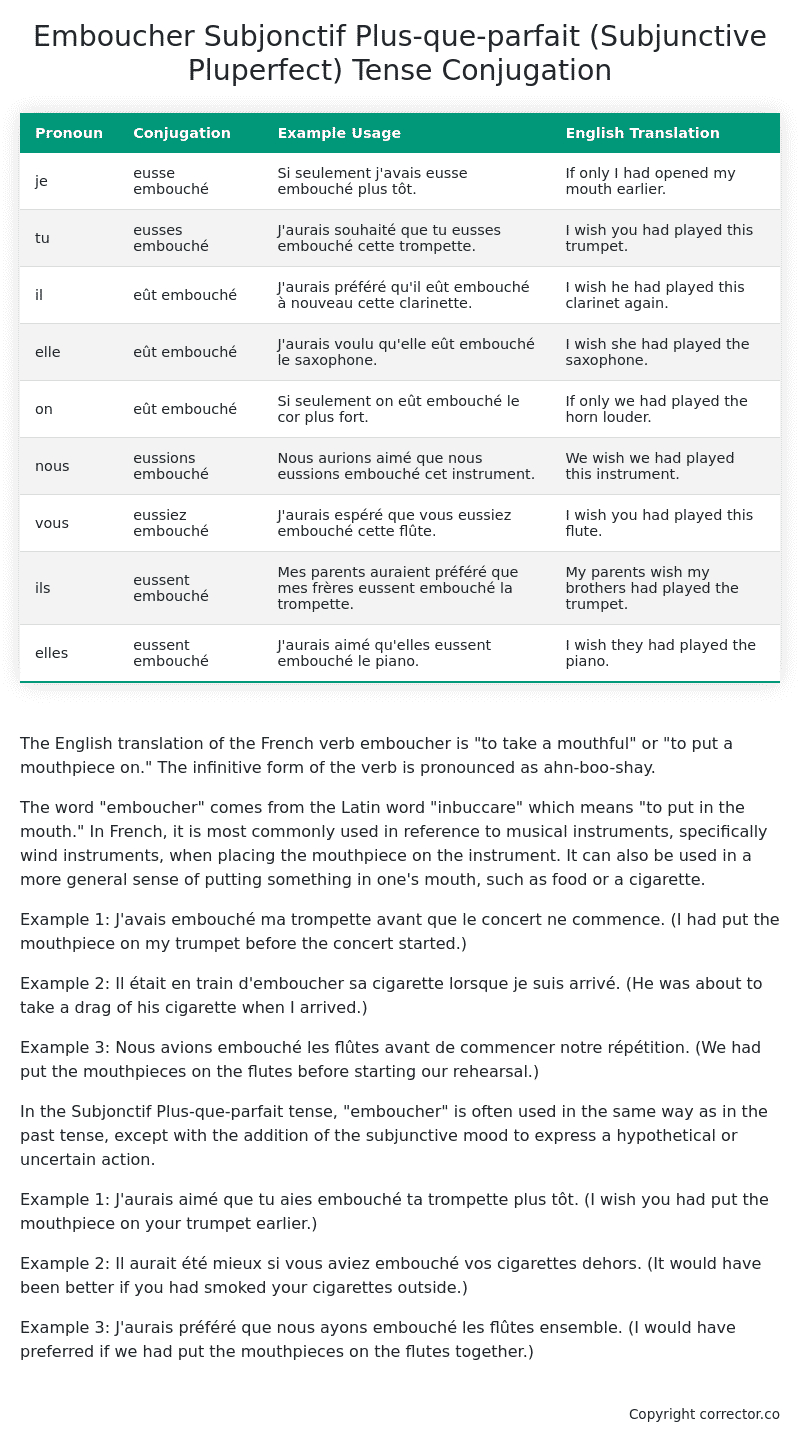Subjonctif Plus-que-parfait (Subjunctive Pluperfect) Tense Conjugation of the French Verb emboucher
Introduction to the verb emboucher
The English translation of the French verb emboucher is “to take a mouthful” or “to put a mouthpiece on.” The infinitive form of the verb is pronounced as ahn-boo-shay.
The word “emboucher” comes from the Latin word “inbuccare” which means “to put in the mouth.” In French, it is most commonly used in reference to musical instruments, specifically wind instruments, when placing the mouthpiece on the instrument. It can also be used in a more general sense of putting something in one’s mouth, such as food or a cigarette.
Example 1: J’avais embouché ma trompette avant que le concert ne commence. (I had put the mouthpiece on my trumpet before the concert started.)
Example 2: Il était en train d’emboucher sa cigarette lorsque je suis arrivé. (He was about to take a drag of his cigarette when I arrived.)
Example 3: Nous avions embouché les flûtes avant de commencer notre répétition. (We had put the mouthpieces on the flutes before starting our rehearsal.)
In the Subjonctif Plus-que-parfait tense, “emboucher” is often used in the same way as in the past tense, except with the addition of the subjunctive mood to express a hypothetical or uncertain action.
Example 1: J’aurais aimé que tu aies embouché ta trompette plus tôt. (I wish you had put the mouthpiece on your trumpet earlier.)
Example 2: Il aurait été mieux si vous aviez embouché vos cigarettes dehors. (It would have been better if you had smoked your cigarettes outside.)
Example 3: J’aurais préféré que nous ayons embouché les flûtes ensemble. (I would have preferred if we had put the mouthpieces on the flutes together.)
Table of the Subjonctif Plus-que-parfait (Subjunctive Pluperfect) Tense Conjugation of emboucher
| Pronoun | Conjugation | Example Usage | English Translation |
|---|---|---|---|
| je | eusse embouché | Si seulement j’avais eusse embouché plus tôt. | If only I had opened my mouth earlier. |
| tu | eusses embouché | J’aurais souhaité que tu eusses embouché cette trompette. | I wish you had played this trumpet. |
| il | eût embouché | J’aurais préféré qu’il eût embouché à nouveau cette clarinette. | I wish he had played this clarinet again. |
| elle | eût embouché | J’aurais voulu qu’elle eût embouché le saxophone. | I wish she had played the saxophone. |
| on | eût embouché | Si seulement on eût embouché le cor plus fort. | If only we had played the horn louder. |
| nous | eussions embouché | Nous aurions aimé que nous eussions embouché cet instrument. | We wish we had played this instrument. |
| vous | eussiez embouché | J’aurais espéré que vous eussiez embouché cette flûte. | I wish you had played this flute. |
| ils | eussent embouché | Mes parents auraient préféré que mes frères eussent embouché la trompette. | My parents wish my brothers had played the trumpet. |
| elles | eussent embouché | J’aurais aimé qu’elles eussent embouché le piano. | I wish they had played the piano. |
Other Conjugations for Emboucher.
Le Present (Present Tense) Conjugation of the French Verb emboucher
Imparfait (Imperfect) Tense Conjugation of the French Verb emboucher
Passé Simple (Simple Past) Tense Conjugation of the French Verb emboucher
Passé Composé (Present Perfect) Tense Conjugation of the French Verb emboucher
Futur Simple (Simple Future) Tense Conjugation of the French Verb emboucher
Futur Proche (Near Future) Tense Conjugation of the French Verb emboucher
Plus-que-parfait (Pluperfect) Tense Conjugation of the French Verb emboucher
Passé Antérieur (Past Anterior) Tense Conjugation of the French Verb emboucher
Futur Antérieur (Future Anterior) Tense Conjugation of the French Verb emboucher
Subjonctif Présent (Subjunctive Present) Tense Conjugation of the French Verb emboucher
Subjonctif Passé (Subjunctive Past) Tense Conjugation of the French Verb emboucher
Subjonctif Imparfait (Subjunctive Imperfect) Tense Conjugation of the French Verb emboucher
Subjonctif Plus-que-parfait (Subjunctive Pluperfect) Tense Conjugation of the French Verb emboucher
Conditionnel Présent (Conditional Present) Tense Conjugation of the French Verb emboucher
Conditionnel Passé (Conditional Past) Tense Conjugation of the French Verb emboucher
L’impératif Présent (Imperative Present) Tense Conjugation of the French Verb emboucher
L’infinitif Présent (Infinitive Present) Tense Conjugation of the French Verb emboucher
(this article)
Struggling with French verbs or the language in general? Why not use our free French Grammar Checker – no registration required!
Get a FREE Download Study Sheet of this Conjugation 🔥
Simply right click the image below, click “save image” and get your free reference for the emboucher Subjonctif Plus-que-parfait tense conjugation!

Emboucher – About the French Subjonctif Plus-que-parfait (Subjunctive Pluperfect) Tense
Formation
Common Everyday Usage Patterns
Hypothetical Situations
Reported Speech
Doubt, Wishes, and Emotions
Interactions with Other Tenses
Present Subjunctive
Imperfect Subjunctive
Conditional
Summary
I hope you enjoyed this article on the verb emboucher. Still in a learning mood? Check out another TOTALLY random French verb conjugation!


